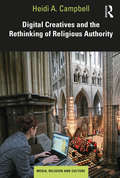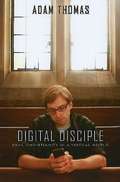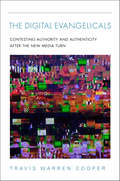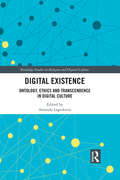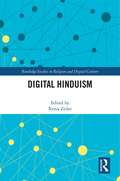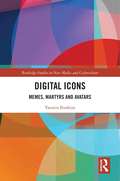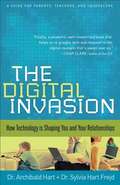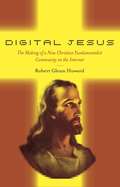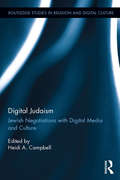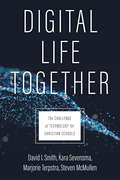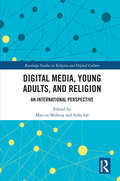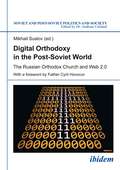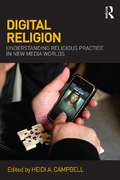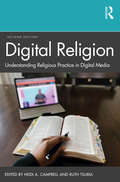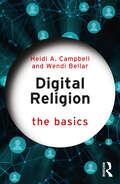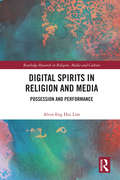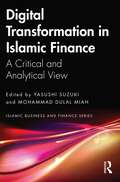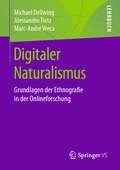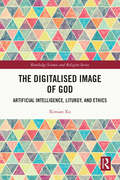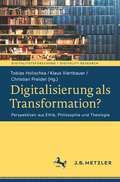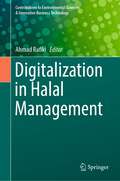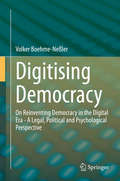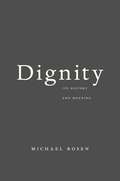- Table View
- List View
Digital Creatives and the Rethinking of Religious Authority (Media, Religion and Culture)
by Heidi A. CampbellMuch speculation was raised in the 1990s, during the first decade of internet research, about the extent to which online platforms and digital culture might challenge traditional understandings of authority, especially in religious contexts. Digital Creatives and the Rethinking of Religious Authority explores the ways in which religiously-inspired digital media experts and influencers online challenge established religious leaders and those who seek to maintain institutional structures in a world where online and offline religious spaces are increasingly intertwined. In the twenty-first century, the question of how digital culture may be reshaping notions of whom or what constitutes authority is incredibly important. Questions asked include: Who truly holds religious power and influence in an age of digital media? Is it recognized religious leaders and institutions? Or religious digital innovators? Or digital media users? What sources, processes and/or structures can and should be considered authoritative online, and offline? Who or what is really in control of religious technological innovation? This book reflects on how digital media simultaneously challenges and empowers new and traditional forms of religious authority. It is a gripping read for those with an interest in communication, culture studies, media studies, religion/religious studies, sociology of religion, computer-mediated communication, and internet/digital culture studies.
Digital Disciple: Real Christianity in a Virtual World
by Adam ThomasThis time in our society is unlike any other. People communicate daily without ever having to speak face to face, news breaks around the world in a matter of seconds, and favorite TV shows can be viewed at our convenience. We are, simultaneously, a people of connection and isolation. As Christians, how do we view our faith and personal ministry in this culture?Adam Thomas invites you to explore this question using his unique, personal, and often humorous insight. Thomas notes, "" The Internet] has added a new dimension to our lives; we are physical, emotional, spiritual, and now virtual people. But I believe that God continues to move through every facet of our existence, and that makes us new kinds of followers. We are digital disciples.""""I gain renewed hope for the future by looking at a new generation of emerging Christian leaders like Adam Thomas.""Brian McLaren, author of A New Kind of Christianity""Digital Disciple is a new kind of pastor's sermon to a new kind of flock. Go ahead and tweet your friends: GOT 2 READ THIS."" Jonathan Wilson-Hartgrove, author, speaker and new monastic""Bright, innovative, perceptive, eloquent, and imaginative -- Adam Thomas is all that and more, as you will see in the pages of his dynamic book."" James W. Moore, author of How God Takes Our Little & Makes it Much
The Digital Evangelicals: Contesting Authority and Authenticity After the New Media Turn
by Travis Warren CooperWhen it comes to evangelical Christianity, the internet is both a refuge and a threat. It hosts Zoom prayer groups and pornographic videos, religious revolutions and silly cat videos. Platforms such as social media, podcasts, blogs, and digital Bibles all constitute new arenas for debate about social and religious boundaries, theological and ecclesial orthodoxy, and the internet's inherent danger and value.In The Digital Evangelicals, Travis Warren Cooperlocates evangelicalism as a media event rather than as a coherent religious tradition by focusing on the intertwined narratives of evangelical Christianity and emerging digital culture in the United States. He focuses on two dominant media traditions: media sincerity, immediate and direct interpersonal communication, and media promiscuity, communication with the primary goal of extending the Christian community regardless of physical distance. Cooper, whose work is informed by ethnographic fieldwork, traces these conflicting paradigms from the Protestant Reformation through the rise of the digital and argues that the tension is culminating in a crisis of evangelical authority. What counts as authentic interaction? Who has authority over the circulation of information?While many studies claim that technology influences religion, The Digital Evangelicals reveals how Protestant metaphors and discourses shaped the emergence of the internet and explores what this relationship with global new media means for evangelicalism.
Digital Existence: Ontology, Ethics and Transcendence in Digital Culture (Routledge Studies in Religion and Digital Culture)
by Amanda LagerkvistDigital Existence: Ontology, Ethics and Transcendence in Digital Culture advances debates on digital culture and digital religion in two complementary ways. First, by focalizing the themes ‘ontology,’ ‘ethics’ and ‘transcendence,’ it builds on insights from research on digital religion in order to reframe the field and pursue an existential media analysis that further pushes beyond the mandatory focus in mainstream media studies on the social, cultural, political and economic dimensions of digitalization. Second, the collection also implies a broadening of the scope of the debate in the field of media, religion and culture – and digital religion in particular – beyond ‘religion,’ to include the wider existential dimensions of digital media. It is the first volume on our digital existence in the budding field of existential media studies.
Digital Hinduism (Routledge Studies in Religion and Digital Culture)
by Xenia ZeilerDigital Religion does not simply refer to religion as it is carried out online, but more broadly studies how digital media interrelate with religious practice and belief. This collection explores Digital Hinduism and consequentially studies how Hinduism is expressed in the digital sphere and how Hindus utilise digital media. Highlighting digital Hinduism and including case studies with foci on India, Asia and the global Hindu diaspora, this book features contributions from an interdisciplinary and international panel of academics. The chapters focus on specific case studies, which in summary exemplify the wide variety and diversity of what constitutes Digital Hinduism today. Applying methods and research questions from various disciplinary backgrounds appropriate to the study of religion and digital culture, such as Religious Studies, South Asian Studies, Anthropology and Media and Communication Studies, this book is vital reading for any scholar interested in the relationship between religion and the digital world.
Digital Icons: Memes, Martyrs and Avatars (Routledge Studies in New Media and Cyberculture)
by Yasmin IbrahimThis book offers critical perspectives on the digital ‘iconic’, exploring how the notion of the iconic is re-appropriated and re-made online, and the consequences for humanity and society. Examining cross-cultural case studies of iconic images in digital spaces, the author offers original and critical analyses, theories and perspectives on the notion of the ‘iconic’, and on its movement, re-appropriation and meaning making on digital platforms. A carefully curated selection of case studies illustrates topics such as phantom memory; martyrdom; denigration and pornographic recoding; digital games as simulacra; and memes as ‘artification’. Situating the notion of the iconic firmly within contemporary cultures, the author takes a thematic approach to investigate the iconic as an unstable and unfinished phenomenon online as it travels through platforms temporally and spatially. The book will be an important resource for academics and students in the areas of media and communications, digital culture, cultural studies, visual communication, visual culture, journalism studies and digital humanities.
The Digital Invasion: How Technology Is Shaping You and Your Relationships
by Archibald D. Hart Sylvia Hart FrejdIn the world of technology, there are just two kinds of people: digital natives and digital immigrants. Digital natives are those born after the advent of the internet. They are comfortable with swift technological change and take the presence of technology in their lives almost completely for granted. They have "digital DNA" flowing through their bodies. On the other hand, digital immigrants are those born before the advent of the internet. Their comfort level with our technology-soaked world is more variable. But they are affected by the digital invasion just as much as their native children. With the latest research supporting them, Dr. Archibald Hart and Dr. Sylvia Hart Frejd uncover both the subtle and the dramatic ways digital technology is changing us from within, focusing their exposé on the impact on the spiritual life of individuals. Through insights from neuroscience and psychology, they offer readers therapeutic and biblical strategies for handling the digital invasion in order to become good stewards of their digital lives. Parents, educators, students, counselors, and pastors will especially appreciate this cultural wake-up call. Much of the focus is from a Christianity perspective, but a lot of good information about what use of technology (especially excessive addictive) does to the brain and our ability to function
Digital Jesus: The Making of a New Christian Fundamentalist Community on the Internet (New and Alternative Religions #5)
by Robert Glenn HowardA fascinating exposition of Christian online communication networks and the Internet's power to build a movementIn the 1990s, Marilyn Agee developed one of the most well-known amateur evangelical websites focused on the “End Times”, The Bible Prophecy Corner. Around the same time, Lambert Dolphin, a retired Stanford physicist, started the website Lambert’s Library to discuss with others online how to experience the divine. While Marilyn and Lambert did not initially correspond directly, they have shared several correspondents in common. Even as early as 1999 it was clear that they were members of the same online network of Christians, a virtual church built around those who embraced a common ideology.Digital Jesus documents how such like-minded individuals created a large web of religious communication on the Internet, in essence developing a new type of new religious movement—one without a central leader or institution. Based on over a decade of interaction with figures both large and small within this community, Robert Glenn Howard offers the first sustained ethnographic account of the movement as well as a realistic and pragmatic view of how new communication technologies can both empower and disempower the individuals who use them. By tracing the group’s origins back to the email lists and “Usenet” groups of the 1980s up to the online forums of today, Digital Jesus also serves as a succinct history of the development of online group communications.
Digital Judaism: Jewish Negotiations with Digital Media and Culture (Routledge Studies in Religion and Digital Culture)
by Heidi A. CampbellIn this volume, contributors consider the ways that Jewish communities and users of new media negotiate their uses of digital technologies in light of issues related to religious identity, community and authority. Digital Judaism presents a broad analysis of how and why various Jewish groups negotiate with digital culture in particular ways, situating such observations within a wider discourse of how Jewish groups throughout history have utilized communication technologies to maintain their Jewish identities across time and space. Chapters address issues related to the negotiation of authority between online users and offline religious leaders and institutions not only within ultra-Orthodox communities, but also within the broader Jewish religious culture, taking into account how Jewish engagement with media in Israel and the diaspora raises a number of important issues related to Jewish community and identity. Featuring recent scholarship by leading and emerging scholars of Judaism and media, Digital Judaism is an invaluable resource for researchers in new media, religion and digital culture.
Digital Life Together: The Challenge of Technology for Christian Schools
by David I. Smith Steven McMullen Kara Sevensma Marjorie TerpstraDigital technologies loom large in the experience of today&’s students. However, parents, teachers, and school leaders have only started to take stock of the ramifications for teaching, learning, and faith. Based on a three-year in-depth study of Christian schools, Digital Life Together walks educators, school leaders, and parents through some of the big ideas that are hidden in our technology habits, going beyond general arguments for or against digital devices to address the nuanced realities of Christian education in a twenty-first-century context.
Digital Life Together: The Challenge of Technology for Christian Schools
by David I. Smith Kara Sevensma Marjorie Terpstra Steven McMullenDigital technologies loom large in the experience of today&’s students. However, parents, teachers, and school leaders have only started to take stock of the ramifications for teaching, learning, and faith. Based on a three-year in-depth study of Christian schools, Digital Life Together walks educators, school leaders, and parents through some of the big ideas that are hidden in our technology habits, going beyond general arguments for or against digital devices to address the nuanced realities of Christian education in a twenty-first-century context.
Digital Media, Young Adults and Religion: An International Perspective (Routledge Studies in Religion and Digital Culture)
by Marcus Moberg Sofia SjöIt has become increasingly clear that an adequate understanding of the contemporary processes of social, cultural, and religious change is contingent on an appreciation of the growing impact of social media. Utilising results of an unprecedented global study, this volume explores the ways in which young adults in seven different countries engage with digital and social media in religiously significant ways. Presenting and analysing the findings of the global research project Young Adults and Religion in a Global Perspective (YARG), an international panel of contributors shed new light on the impact of social media and its associated technologies on young people’s religiosities, worldviews, and values. Case studies from China, Finland, Ghana, Israel, Peru, Poland, and Turkey are used to demonstrate how these developments are progressing, not just in the West, but across the world. This book is unique in that it presents a truly macroscopic perspective on trends in religion amongst young adults. As such, it will be of great interest to scholars working in religious studies, digital media, communication studies, sociology, cultural studies, theology and youth studies.
Digital Orthodoxy in the Post-Soviet World: The Russian Orthodox Church and Web 2.0 (Soviet and Post-Soviet Politics and Society #155)
by Mikhail SuslovThis volume explores the relationship between new media and religion, focusing on the digital era's impact on the Russian Orthodox Church. A believer may now enter a virtual chapel, light a candle through drag-and-drop, send an online prayer request, or worship virtual icons and relics. In recent years, however, Church leaders and public figures have become increasingly skeptical about new media. The internet, some of them argue, breaches Russia's "spiritual sovereignty" and implants values and ideas alien to Russian culture. This collection examines how Orthodox ecclesiology has been influenced by its new digital environment, such as the intersection of virtual religious life with religious experience in the "real" church, the role of clerics on the Russian Web, and the transformation of the Orthodox notion of sobornost' (catholicity), asking whether and how Orthodox activity on the internet can be counted as authentic religious practice.
Digital Religion: Understanding Religious Practice in New Media Worlds
by Heidi A. CampbellDigital Religion offers a critical and systematic survey of the study of religion and new media. It covers religious engagement with a wide range of new media forms and highlights examples of new media engagement in all five of the major world religions. From cell phones and video games to blogs and Second Life, the book: provides a detailed review of major topics includes a series of case studies to illustrate and elucidate the thematic explorations considers the theoretical, ethical and theological issues raised. Drawing together the work of experts from key disciplinary perspectives, Digital Religion is invaluable for students wanting to develop a deeper understanding of the field.
Digital Religion: Understanding Religious Practice in Digital Media
by Heidi A. Campbell Ruth TsuriaThis book offers a critical and systematic survey of the study of religion and digital media. It covers religious engagement with a wide range of digital media forms and highlights examples of new media engagement in all five of the major world religions. From mobile apps and video games to virtual reality and social media, the book: • provides a detailed review of major topics including ritual, identity, community, authority, and embodiment; • includes a series of engaging case studies to illustrate and elucidate the thematic explorations; • considers the theoretical, ethical, and theological issues raised. This unique volume draws together the work of experts from key disciplinary perspectives and is the go-to volume for students and scholars wanting to develop a deeper understanding of the subject area. Thoroughly updated throughout with new case studies and in-depth analysis of recent scholarship and developments, this new edition provides a comprehensive overview of this fast-paced, constantly developing, and fascinating field.
Digital Religion: The Basics (The Basics)
by Heidi A. Campbell Wendi BellarDigital Religion: The Basics explores how digital media and internet platforms are transforming religious practice in a digital age and the impact this has had on religious culture in contemporary society. Through exploring six defining characteristics of how religion is acted out online, including multisite reality, convergence practice, networked community, storied identity, shifting authority, and experiential authenticity, the book considers how digital religion both shapes, and is influenced by, religion offline. Questions asked include: • How is religion being performed and reimagined through digital media and cultures? • In what ways do the practices of religion online merge or correspond with shifts in perspective taking place in offline religious practice? • How do the key findings of religion online reflect broader social, cultural, and structural practices observed within mobile, networked society? With case studies and further readings, Digital Religion: The Basics is a must-read for students wanting to come to grips with how religion is changing and experienced through digital media.
Digital Spirits in Religion and Media: Possession and Performance (Routledge Research in Religion, Media and Culture)
by Alvin Eng LimIn many contemporary and popular forms of religious practice, digital technology and the spiritual are inseparable. Ranging from streaming broadcasts of spiritual possessions to screenings of mass prayer conferences in stadiums, spirits and divinities now have new forms in which they can materialise. By offering the notion of ‘digital spirits’, this book critically attends to the intersections of digital media and spiritual beings. It also puts forward a new performative perspective on how they interact. Taking cues from the work of Stewart Hoover and Heidi Campbell, among others, the book begins with an outline of the current debates around religion, performance and digital media. It then moves on to examine how mediality and religion, where embodied practices are carried out alongside virtual practices, work together in contemporary Asia. These case studies focus on lived religious practices in combination with various forms of media, and so help demonstrate that digital technology in particular reveals the layered processes of spirituality in practice. Gods and divinities have always relied on media to manifest, and this book is a fascinating exploration of how digital media has continued that tradition and taken it in new directions. As such, it will be of great interest to scholars of religious studies, digital media and performance studies.
Digital Transformation in Islamic Finance: A Critical and Analytical View (Islamic Business and Finance Series)
by Yasushi Suzuki Mohammad Dulal MiahThe ongoing digital transformation is shaping the Islamic mode of financial intermediation and the impact on the faith-based financial mode has been multifaceted. This has raised a host of interesting questions: what is the degree of penetration of Islamic finance in the fintech industry? Are Islamic financial institutions (IFIs) or banks ready to embrace fintech? Is fintech an enabler or barrier to achieve the intended purpose of Islamic finance? Will technology narrow the division between Islamic and conventional finance in the future? These are existential questions for Islamic finance and the book endeavors to examine the impact of financial technology on the industry. The book assesses various fintech business models and how they could be a threat or an opportunity. It also examines whether fintech provides IFIs an edge to serve clients following the Shariah norms and how the adoption of fintech in the Islamic mode is required for meeting the maqasid Al Shariah. The book discusses applicability of fintech like blockchain, digital currency, big data, and AI to different branches of Islamic finance. This book will interest students, analysts, policymakers, and regulators who are working on Islamic finance, financial economics, Islamic economics, and development finance.
Digitaler Naturalismus: Grundlagen der Ethnografie in der Onlineforschung
by Michael Dellwing Alessandro Tietz Marc-André VrecaAls „zentrales Nervensystem des 21. Jahrhunderts“ (Doctorow 2017) ist das Internet heute so tief in die Gegenwartswelt und ihre Alltagspraktiken eingewoben, dass es schwierig wäre, ein sozialwissenschaftliches Forschungsfeld zu identifizieren, das digitale Kulturen noch ignorieren könnte. Ethnografie steht bereits im Zentrum der Untersuchung von Online-Kontexten. Ihren Kern macht die Orientierung an Deutungen aus, wie sie unter den Beteiligten tatsächlich verwendet werden. Da Deutungen kontextabhängig sind, besteht die Ethnografie darauf, dass die Deutungen der Beteiligten nur in ihrem Herkunftsumfeld erforscht werden können. Sie hat hierfür den Begriff der „naturalistischen Forschung“ entwickelt. Diese Fokussierung der Ethnografie auf Innendeutungen erfasst dabei auch die Methode: Die Ethnografie war immer von Anpassung, Flexibilität und Bescheidenheit geprägt, die im Zweifel Vorrang vor mitgebrachten methodischen Regeln haben. Eine „neue“ Ethnografie für die Onlineforschung ist daher nicht notwendig. Die Wahl der Forschungswege orientiert sich regulär an den Arten tatsächlicher Interaktion im Feld. Ein „digitaler Naturalismus“, der diese Orientierung in die Onlineforschung bringt, kann vermeiden, dass verbreitete Außendeutungen, die ein Verständnis digitaler Kulturen regulär häufig eher behindern, über methodische Umwege zurück in die Forschung gelangen.
The Digitalised Image of God: Artificial Intelligence, Liturgy, and Ethics (Routledge Science and Religion Series)
by Ximian XuThis book focuses on the idea of the imago Dei to engaging theologically with artificial intelligence (AI). It reflects on how enormous progress in the development of AI has raised some challenges to Christian theology. Questions explored include: is AI created in the imago Dei? If so, does AI challenge the uniqueness of the human being as the imago Dei? If not, could AI be incorporated into human communities as a human companion in the same way as a natural human person? Would AI eventually develop to have human-level consciousness and be capable of performing liturgies and ethical actions? Bringing to light the radical distinction between the imago Dei and the imago hominis, the book constructs a theo-ontological foundation for AI and draws on the Reformed theology of archetype–ectype as a metaphysical tool to deploy a holistic account of the imago Dei in theology–AI dialogues. The author argues that the imago Dei is the signifier of the beginning both of God–human stories and stories of human ethical performances towards others. From the perspective of the image of the imago Dei, it can be argued that AI can somehow participate into the narration of these religious and ethical stories.This book will be of particular interest to scholars of theology and those working in the field of religion and science/technology.
Digitalisierung als Transformation?: Perspektiven aus Ethik, Philosophie und Theologie (Digitalitätsforschung / Digitality Research)
by Tobias Holischka Klaus Viertbauer Christian PreidelDigitalisierung ist zum Inbegriff geworden für den Übergang in eine neue Zeit mit neuen Möglichkeiten und Fragestellungen. Doch wofür steht ‚Digitalisierung‘ eigentlich jenseits der Computertechnologie und den damit verbundenen technischen Verfahren? Die Digitalisierung scheint einen Prozess mit weitreichenden Folgen für unsere Lebenswelt, für unser Denken, Handeln und Interagieren in Gang zu setzen. Neben diesen transformativen Bewegungen lassen sich dabei auch reduktive Tendenzen beobachten, wenn etwa soziale Interaktion zu technischer Kommunikation wird oder wenn die Grenzen zwischen Mensch und Maschine immer mehr verschwimmen. Der Band geht diesen Fragen nach und identifiziert Digitalisierung als einen wesentlichen Grund für den strukturellen Wandel der Gesellschaft. Dabei werden die philosophischen, ethischen und theologischen Dimensionen erörtert und darauf befragt, wo sich reduktive und/oder transformative Prozesse diagnostizieren und an ausgewählten Beispielen festmachen lassen.
Digitalization in Halal Management (Contributions to Environmental Sciences & Innovative Business Technology)
by Ahmad RafikiThe book emphasizes the digitalization process in halal management of products and industries, which relate to the comparisons and cases in many countries viewed from an Islamic perspective. It needs a new view of using information technology to achieve wider coverage of promoting halal products as well as to develop the halal industries. A global perspective that consists of experiences from Muslim majority and minority countries will be presented in this book. This topic is also associated with the concepts on Islamic business and management. Islamic business not only focuses on finance/banking, but beyond that Islam teaches all people to do Shariah-compliant transactions or business. The book gives solutions to halal industry through digitalization. Islam has many solutions to be offered, and thus, it is important to reveal and discuss the Islamic way of managing business, including halal management. The book also discusses the halal products and its certifications. This book is intended for stakeholders of different industries, from environmental to food, in the need of digital tools and IT infrastructure.
Digitising Democracy: On Reinventing Democracy in the Digital Era - A Legal, Political and Psychological Perspective
by Volker Boehme-NeßlerThis book argues that in the digital era, a reinvention of democracy is urgently necessary. It discusses the mounting evidence showing that digitalisation is pushing classical parliamentary democracy to its limits, offering examples such as how living in a filter bubble and debating with political bots is profoundly changing democratic communication, making it more emotional, hysterical even, and less rational. It also explores how classical democracy involves long, slow thinking and decision processes, which don’t fit to the ever-increasing speed of the digital world, and examines the technical developments some fear will lead to governance by algorithms.In the digitalised world, democracy no longer functions as it has in the past. This does not mean waving goodbye to democracy – instead we need to reinvent it. How this could work is the central theme of this book.
Dignity: Its History and Meaning
by Michael RosenDignity plays a central role in current thinking about law and human rights, but there is sharp disagreement about its meaning. Combining conceptual precision with a broad historical background, Michael Rosen puts these controversies in context and offers a novel, constructive proposal. “Penetrating and sprightly…Rosen rightly emphasizes the centrality of Catholicism in the modern history of human dignity. His command of the history is impressive…Rosen is a wonderful guide to the recent German constitutional thinking about human dignity…[Rosen] is in general an urbane and witty companion, achieving his aim of accessibly written philosophy.” —Samuel Moyn, The Nation “[An] elegant, interesting and lucid exploration of the concept of dignity...Drawing on classical, liberal and Catholic traditions, Rosen hopes to rehabilitate dignity to its rightful place near the centre of moral thought...Rosen's admirable book deserves wide attention from political theorists, jurisprudes and political philosophers.” —Simon Blackburn, Times Higher Education “Dignity deserves to be widely read, not only for its intrinsic interest, but also as a corrective to the habit of discussing such topics in abstraction from their social context. Whether or not one agrees with Rosen's arguments, there can be no doubt he has widened our horizons.” —Rae Langton, Times Literary Supplement
Dignity: Its History and Meaning
by Michael RosenDignity plays a central role in current thinking about law and human rights, but there is sharp disagreement about its meaning. Combining conceptual precision with a broad historical background, Michael Rosen puts these controversies in context and offers a novel, constructive proposal.“Penetrating and sprightly…Rosen rightly emphasizes the centrality of Catholicism in the modern history of human dignity. His command of the history is impressive…Rosen is a wonderful guide to the recent German constitutional thinking about human dignity…[Rosen] is in general an urbane and witty companion, achieving his aim of accessibly written philosophy.”—Samuel Moyn, The Nation“[An] elegant, interesting and lucid exploration of the concept of dignity...Drawing on classical, liberal and Catholic traditions, Rosen hopes to rehabilitate dignity to its rightful place near the centre of moral thought...Rosen's admirable book deserves wide attention from political theorists, jurisprudes and political philosophers.”—Simon Blackburn, Times Higher Education“Dignity deserves to be widely read, not only for its intrinsic interest, but also as a corrective to the habit of discussing such topics in abstraction from their social context. Whether or not one agrees with Rosen's arguments, there can be no doubt he has widened our horizons.”—Rae Langton, Times Literary Supplement
